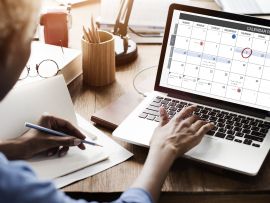
In April 2022, Google added the ability to join a call from within Google Docs, Sheets and Slides. Select the Google Meet icon in the upper right corner of your document while in Chrome on a computer to join or start a Meet session. When you start a session this way, Meet launches in a side panel to the right of your document.
SEE: Feature comparison: Time tracking software and systems (TechRepublic Premium)
You might think of this feature as one-tab, document-first videoconferencing. One-tab, since both your document and Meet session require just one Chrome browser tab, rather than two tabs—one for Meet and one for a Docs, Sheets or Slides file—to manage or arrange. And document-first videoconferencing, since your document occupies the majority of display space, with Meet placed to the side.
As always, you choose whether your Google Docs, Sheets or Slides file is shared or not. When private, you use your document as you wish: Rely on it for reference, take notes or make edits as desired. When shared, your collaborators might view, comment on or make edits to the document as Meet participants discuss issues.
Additionally, any time you have a Google Meet session active, you may open a Google Docs, Sheets or Slides file, then select the Meet icon in the document and choose to “Bring the call here.” This lets you transition from a standard Google Meet session (e.g., video-focused) to one that displays both your document and your active Meet session together into one tab.
The following steps cover how to use Google Meet within Google Docs, Sheets or Slides in Chrome on a computer.
Join or start a meeting from Google Docs, Sheets or Slides
The Google Meet icon displays in the upper right corner area of Google Docs, Sheets or Slides on the web, as shown in Figure A. If you have a new document open—and when you aren’t yet in a Google Meet session—select it to display three options.
Figure A

First, upcoming Google Calendar events that include a Google Meet link appear. Select a meeting from the list, and then the system offers a preview of video from your webcam along with options to Join the Call or Just Present this Tab.
Alternatively, select Start a New Meeting to initiate a new Google Meet session. Your session begins in a side panel, along with the meeting link (near the middle of the panel) and various session settings and controls (at the bottom of the panel). Copy the link to share it with other people via Google Chat, Gmail or in Google Chat Spaces.
Use the third option, Use a Meeting Code, to enter a Google Meet session code. You might do this, for example, if you want to join a session while in a conference room with an existing Google Meet session active, but to which you had not initially been invited.
How to Share the Link or Present this Tab from a side panel Google Meet session
With your Google Meet session active in a side panel, you have at least two ways to give meeting participants access to the open Google Docs, Sheet or Slides file: Share the Link or Present this Tab.
To collaborate on a document, choose Share the Link and the system generates an in-session message, “Let’s work on this document together” followed by the Google Docs, Sheets or Slides link, as shown in Figure B. Select the send icon to share the message with the people in your meeting. You may need to adjust the document Share settings to ensure that participants have access. (See How to share Google Docs, Sheets, and Slides for detailed share setting instructions.)
Figure B

Choose the Present this Tab option (Figure B, lower right icon) to display the document in a separate window in the Google Meet session. Unlike the Share the Link option, which provides access to the actual document, the Present this Tab feature simply displays your document in the Google Meet session and does not give meeting participants access to the document.
How to move a Meet session between three display options
You may move your Meet session into three distinct display configurations. First, Google Meet in the side panel emphasizes your document, while simultaneously showing video, chat and Meet controls. Second, a picture-in-document option minimizes Meet to a small video window overlay. (Place your cursor over the video image, then select it to dock the video in the side panel again.) Third, the standard option returns Meet to a session that fills a full tab, without the side panel Meet experience. You may move to any of these display options during a meeting.
Two options display as icons in the upper right corner of the Google Meet side panel, as shown in Figure C. The icon with an arrow pointing to the corner offers the option to move the Meet session to a separate tab. This is useful if you no longer want to refer to a document and want a standard Google Meet experience. The other icon, with a small box within a larger box, removes Google Meet from the side panel and places the video as an overlay on your document.
Figure C

The third option isn’t necessarily obvious but can be quite useful. When you have any sort of Google Meet session active in Chrome, in a different tab open any Google Docs, Sheets or Slides item, then select the Google Meet icon in the upper right (i.e., much as you would to start a Meet session from Docs, Sheets or Slides). Since the system detects that there’s an active Google Meet session, select the Bring the Call Here option, as shown in Figure D, to move the active Meet call into the side panel of your document.
Figure D

What’s your experience?
For modern meetings, the ability to add a video conference to a document is as important as the ability to print was when meeting materials were primarily paper. I do hope Google will weave document-adjacent video conferencing capabilities into all of the Workspace apps, including Google Jamboard, Google Drawings, Google Forms and Google Sites.
If you’ve used Google Meet in the side panel of a Google Docs, Sheets or Slides file, what did you think of it? Did you use the feature primarily so you could continue to work privately on a file during a meeting? Or did you collaborate with colleagues both in a document and via video? How often do you switch Meet from the side panel to picture-in-picture to a full browser tab? Let me know how you use documents alongside video conferencing, either with a comment below or on Twitter (@awolber).











